Module 11 Unit 1 In China, we open a gift later.课件(共33张PPT)
文档属性
| 名称 | Module 11 Unit 1 In China, we open a gift later.课件(共33张PPT) | 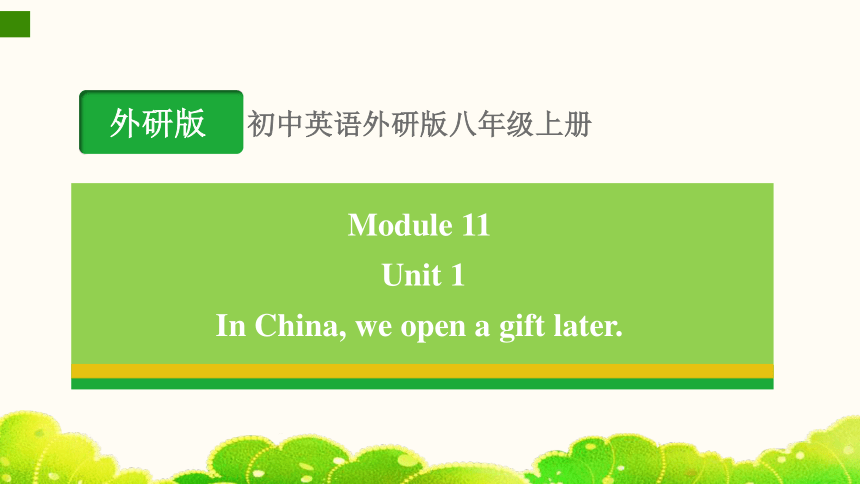 | |
| 格式 | pptx | ||
| 文件大小 | 20.0MB | ||
| 资源类型 | 教案 | ||
| 版本资源 | 外研版 | ||
| 科目 | 英语 | ||
| 更新时间 | 2024-02-01 08:05:22 | ||
图片预览

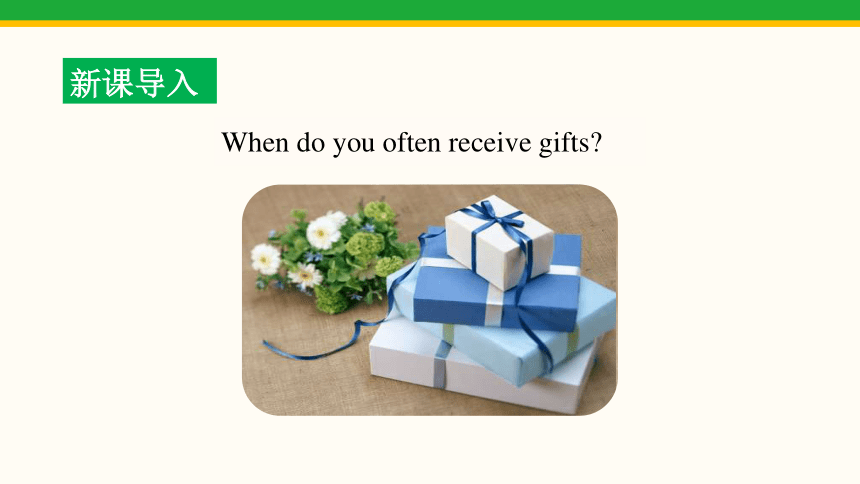
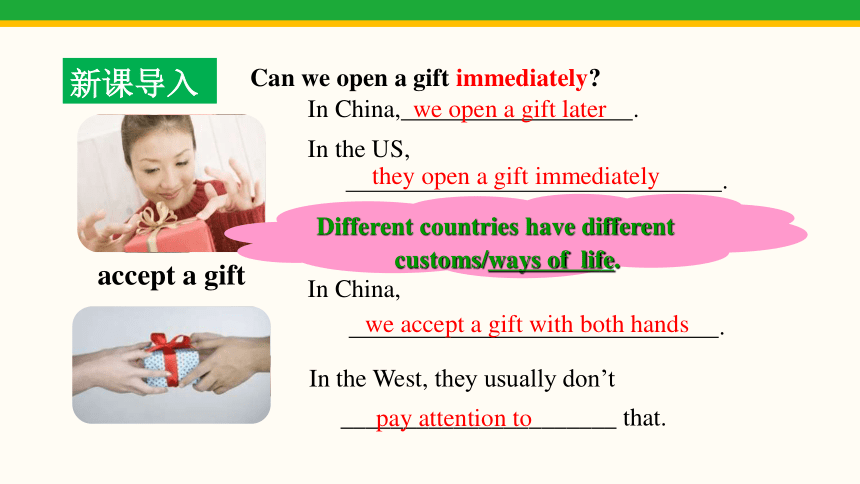
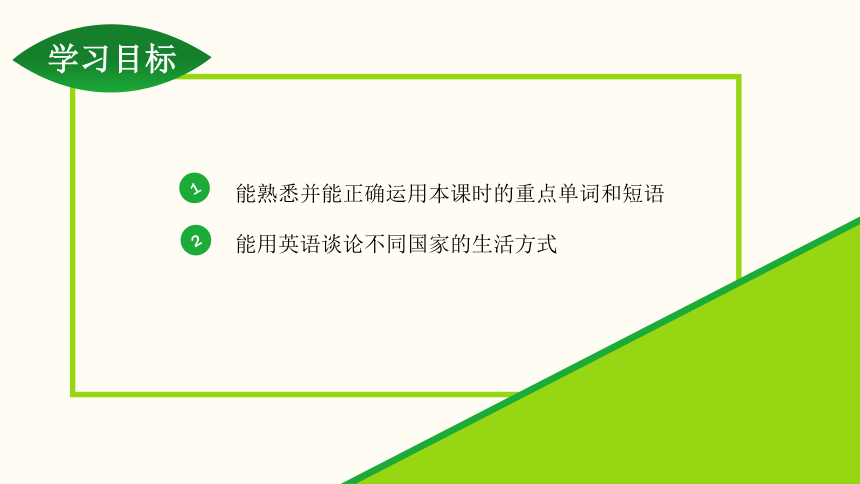

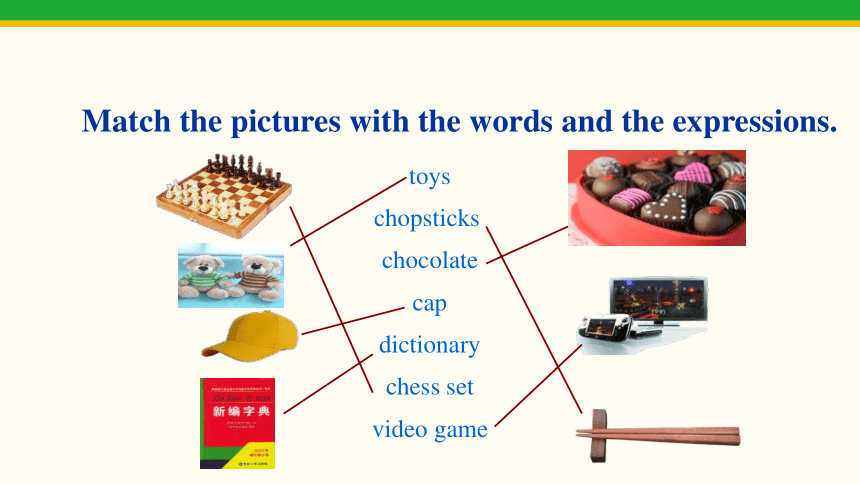
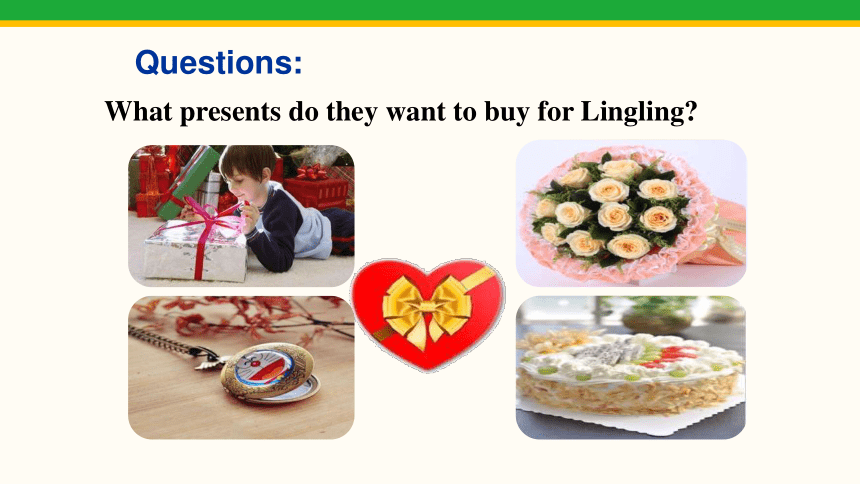
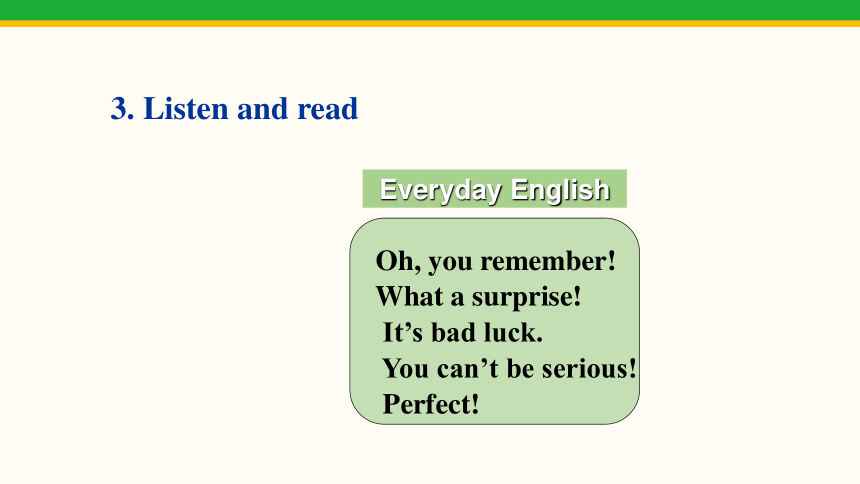
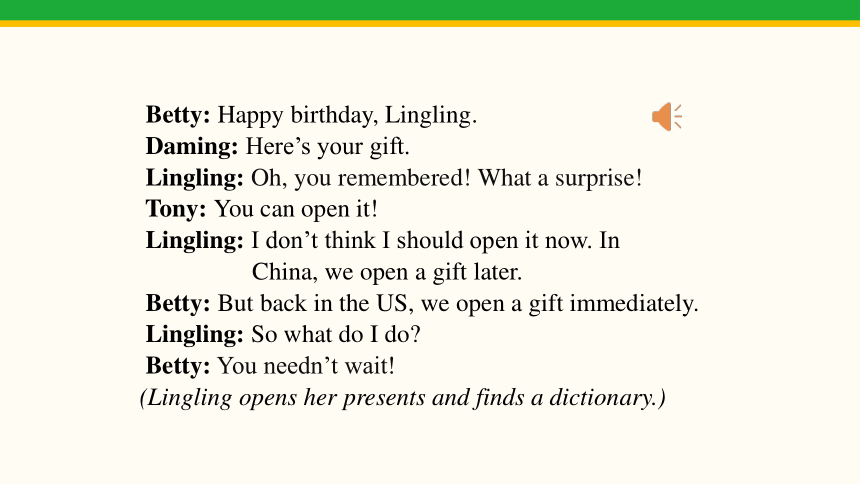
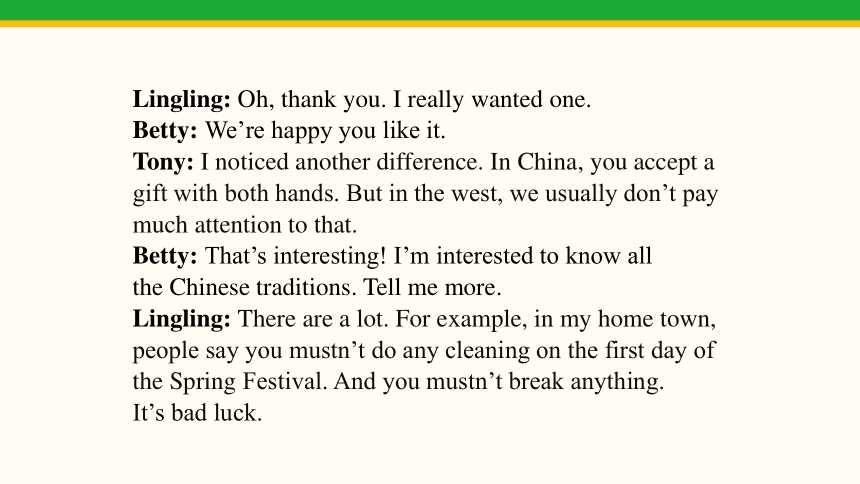
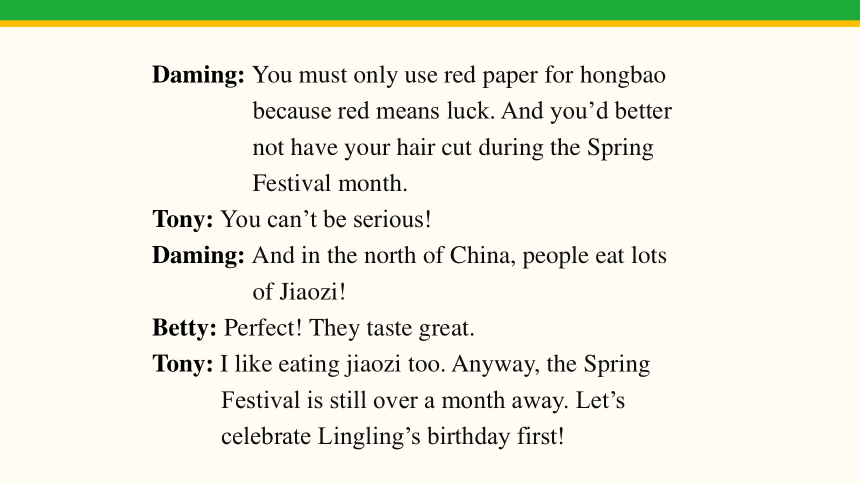
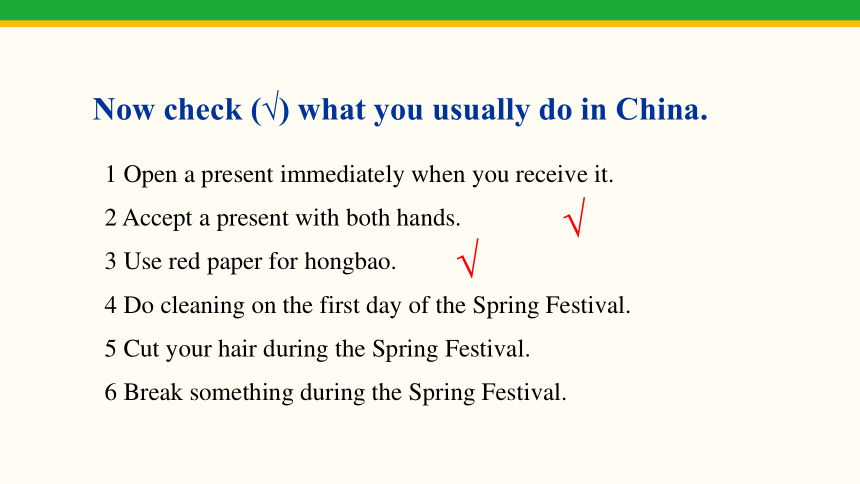
文档简介
(共33张PPT)
外研版
初中英语外研版八年级上册
Module 11
Unit 1
In China, we open a gift later.
新课导入
When do you often receive gifts
新课导入
Can we open a gift immediately
In China, .
In the US,
we open a gift later
they open a gift immediately
.
accept a gift
In China,
In the West, they usually don’t
______________________ that.
.
we accept a gift with both hands
pay attention to
Different countries have different customs/ways of life.
1
2
能熟悉并能正确运用本课时的重点单词和短语
能用英语谈论不同国家的生活方式
baseball cap
chocolate
dictionary
video game
chess set
chopsticks
toy
Listen and number.
6
3
7
5
2
4
1
知识梳理
toys
chopsticks
chocolate
cap
dictionary
chess set
video game
Match the pictures with the words and the expressions.
Questions:
What presents do they want to buy for Lingling
3. Listen and read
Everyday English
Oh, you remember!
What a surprise!
It’s bad luck.
You can’t be serious!
Perfect!
Betty: Happy birthday, Lingling.
Daming: Here’s your gift.
Lingling: Oh, you remembered! What a surprise!
Tony: You can open it!
Lingling: I don’t think I should open it now. In
China, we open a gift later.
Betty: But back in the US, we open a gift immediately.
Lingling: So what do I do
Betty: You needn’t wait!
(Lingling opens her presents and finds a dictionary.)
Lingling: Oh, thank you. I really wanted one.
Betty: We’re happy you like it.
Tony: I noticed another difference. In China, you accept a gift with both hands. But in the west, we usually don’t pay much attention to that.
Betty: That’s interesting! I’m interested to know all the Chinese traditions. Tell me more.
Lingling: There are a lot. For example, in my home town, people say you mustn’t do any cleaning on the first day of the Spring Festival. And you mustn’t break anything. It’s bad luck.
Daming: You must only use red paper for hongbao
because red means luck. And you’d better
not have your hair cut during the Spring
Festival month.
Tony: You can’t be serious!
Daming: And in the north of China, people eat lots
of Jiaozi!
Betty: Perfect! They taste great.
Tony: I like eating jiaozi too. Anyway, the Spring
Festival is still over a month away. Let’s
celebrate Lingling’s birthday first!
Now check (√) what you usually do in China.
1 Open a present immediately when you receive it.
2 Accept a present with both hands.
3 Use red paper for hongbao.
4 Do cleaning on the first day of the Spring Festival.
5 Cut your hair during the Spring Festival.
6 Break something during the Spring Festival.
√
√
4 Complete the passage with the words in the box.
It is always a(n)(1) to receive gifts from
family members and friends. In China, we usually
(2) a gift with both hands and open it later.
But in the west, people usually do not pay much
(3) to that. During the Spring Festival, there
are many (4) . For example, people in the
north of China eat lots of jiaozi. They (5) great.
accept attention surprise taste traditions
traditions
surprise
accept
attention
taste
5 Read and predict how the speaker will
pronounce the underlined words.
1 I don’t think I should open it now.
2 You needn’t wait.
3 You mustn’t break anything.
4 You must only use red paper for hongbao.
5 You’d better not cut your hair during the Spring
Festival month.
Now listen and check.
6 Read the sentences in Activity 5 aloud.
7 Think about what you must and mustn't/can't do in the situations. Write notes.
Must Mustn't/ can’t
At school Put up your hand before you talk
At the dining table talk with food in your mouth
Now work in pairs. Say what you mustn't/ can’t do.
探究一
Oh, you remembered! What a surprise!
噢,你还记得,好惊讶!
英语的感叹句通常以how和what开头,
其中what修饰名词,how 修饰形容词、副词。
e.g. What a clever boy he is!
(他是个)多么聪明的男孩啊!
How kind you are!
你心肠真好!
重难句探究
2. we usually don’t pay much attention to that.
我们通常不太重视那个。
pay attention to 注意;专心;集中注意力。
e.g. I never seem to be able to pay attention to our teacher.
我似乎向来就没法去注意我们的老师。
3. You’d better not have your hair cut during the Spring Festival month.
你最好不要在正月里剪头发。
you’d better do sth. 最好做某事
you’d better not do sth 最好不要做某事
You'd better make sure how much the sofa is.
你最好弄清楚那沙发到底多少钱。
You'd better not mention the matter when you talk with him.
和他谈话时,最好不要提这件事。
4. You can't be serious! 你不是认真的吧!
serious在此处的意思是“认真的,不开玩笑的”
e.g. —The school has decided to give us another day's holiday.
—You can't be serious!
——我们学校决定再给我们一天的假期。
——你在开玩笑吧!
活动小结
通过以上的活动,我们可以知道:
英语的感叹句通常以how和what开头,
其中what修饰名词,how 修饰形容词、副词或动词。
pay attention to 注意;专心;集中注意力。
同义表达:take care of, be careful
you’d better do sth. 最好做某事
you’d better not do sth 最好不要做某事
You can't be serious! 你不是认真的吧!
serious在此处的意思是“认真的,不开玩笑的”
Grammar Focus
情态动词
must, may, can, need, must等
情态动词探究
情态动词
情态动词后面 + 动词原形
情态动词没有人称和数的变化
I can not play basketball.
I need buy / bought a computer.
She can / cans ride a horse.
Amy need / needs buy a book.
否定式构成是在情态动词后面加 "not"
I can play / played basketball.
(能)
用法:
① 表示能力 :
He can speak a little English.
Can you fly
③ 表示请求或允许 :
Can I help you
② 表示猜测 :
That can not be our English teacher,
because she has gone to Shanghai .
could也可表示请求,语气委婉,主要用于疑问句,
不可用于肯定句,答语应用can
Could I come to see you tomorrow
Yes, you can. (否定答语可用No, I'm afraid not.)
{
{
{
{
can
用法:
①表示请求或允许 :
May I go home,please
(1)以may(表许可或请求)开头的一般疑问句,肯定回答用may,否定回答用mustn't或can't. (2)在疑问句中不用于第二人称
② 表示可能性 :
You may be right.
No, you _________
{
may
(可以)
Yes, you may.
注意
might为may的过去式,但也可以代替may,
语气较为婉转客气或更加不肯定。
You might be right.
mustn’t / you can’t.
试比较 :
● You may not smoke here.(不可以) 语气轻
● You can’t smoke here.(不能)重
● You mustn’t smoke here.(决不可)最重
can't
may not
mustn't
↓
既可以做情态动词, 也可以做实意动词
② 实意动词 (need to do sth) :
① 情态动词 (need do sth)
I need buy a big house.
need
(需要)
He need drive me home.
Do I need to buy a big house
He needs to buy a big house.
Need I buy a big house
-- Yes, you must.
-- No, you needn’t / don’t have to. (不必要)
-- Yes, you do. /-- No, you don’t.
{
{
{
② 表示推测“肯定,一定” :
① 表示义务、必要或命令 :
You must come early tomorrow.
---Must I finish my homework first
They must be at home. The light is on.
--- Yes, you must.
--- No, you don't have to/ needn't.
{
must
(必须)
注意
must开头的疑问句,其否定回答通常用 don‘t have to
或needn’t 。而不用mustn't
mustn't
(禁止)
③ 否定时表示 “禁止” :
You mustn’t smoke here.
It’s eleven o’clock . I have to go now .
It was getting dark. He had to finish the work first .
I don’t have to go now .
He doesn’t have to finish the work first.
have to
(必须)
注意
have to 表示客观因素
We are very glad at the party , but it’s 11 , so we have to leave now .
must 表示主观因素
We must study hard to find a good job for ourselves .
must
(必须)
had better意为“最好”,表示建议和劝告,
简略式为 'd better,否定式为had better not,
后面跟动词原形。
You had better go to see a doctor.
You’d better not stay here.
had better
(最好)
My brother was very ill, so I call the
doctor in the middle of the night.
He said that they work hard.
You don't have to tell him about it.
You mustn't tell him about it.
你不一定要把此事告诉他。
你一定不要把这件事告诉他 .
have to
must
had to
must
区别
}
活动小结
通过以上的活动,我们可以知道:
情态动词
must, may, can, need, must的具体用法
重点句型:
What a surprise!
pay attention to
you’d better do sth.
You can't be serious!
情态动词
must, may, can, need, must等
Module 11 Unit 1
外研版
初中英语外研版八年级上册
Module 11
Unit 1
In China, we open a gift later.
新课导入
When do you often receive gifts
新课导入
Can we open a gift immediately
In China, .
In the US,
we open a gift later
they open a gift immediately
.
accept a gift
In China,
In the West, they usually don’t
______________________ that.
.
we accept a gift with both hands
pay attention to
Different countries have different customs/ways of life.
1
2
能熟悉并能正确运用本课时的重点单词和短语
能用英语谈论不同国家的生活方式
baseball cap
chocolate
dictionary
video game
chess set
chopsticks
toy
Listen and number.
6
3
7
5
2
4
1
知识梳理
toys
chopsticks
chocolate
cap
dictionary
chess set
video game
Match the pictures with the words and the expressions.
Questions:
What presents do they want to buy for Lingling
3. Listen and read
Everyday English
Oh, you remember!
What a surprise!
It’s bad luck.
You can’t be serious!
Perfect!
Betty: Happy birthday, Lingling.
Daming: Here’s your gift.
Lingling: Oh, you remembered! What a surprise!
Tony: You can open it!
Lingling: I don’t think I should open it now. In
China, we open a gift later.
Betty: But back in the US, we open a gift immediately.
Lingling: So what do I do
Betty: You needn’t wait!
(Lingling opens her presents and finds a dictionary.)
Lingling: Oh, thank you. I really wanted one.
Betty: We’re happy you like it.
Tony: I noticed another difference. In China, you accept a gift with both hands. But in the west, we usually don’t pay much attention to that.
Betty: That’s interesting! I’m interested to know all the Chinese traditions. Tell me more.
Lingling: There are a lot. For example, in my home town, people say you mustn’t do any cleaning on the first day of the Spring Festival. And you mustn’t break anything. It’s bad luck.
Daming: You must only use red paper for hongbao
because red means luck. And you’d better
not have your hair cut during the Spring
Festival month.
Tony: You can’t be serious!
Daming: And in the north of China, people eat lots
of Jiaozi!
Betty: Perfect! They taste great.
Tony: I like eating jiaozi too. Anyway, the Spring
Festival is still over a month away. Let’s
celebrate Lingling’s birthday first!
Now check (√) what you usually do in China.
1 Open a present immediately when you receive it.
2 Accept a present with both hands.
3 Use red paper for hongbao.
4 Do cleaning on the first day of the Spring Festival.
5 Cut your hair during the Spring Festival.
6 Break something during the Spring Festival.
√
√
4 Complete the passage with the words in the box.
It is always a(n)(1) to receive gifts from
family members and friends. In China, we usually
(2) a gift with both hands and open it later.
But in the west, people usually do not pay much
(3) to that. During the Spring Festival, there
are many (4) . For example, people in the
north of China eat lots of jiaozi. They (5) great.
accept attention surprise taste traditions
traditions
surprise
accept
attention
taste
5 Read and predict how the speaker will
pronounce the underlined words.
1 I don’t think I should open it now.
2 You needn’t wait.
3 You mustn’t break anything.
4 You must only use red paper for hongbao.
5 You’d better not cut your hair during the Spring
Festival month.
Now listen and check.
6 Read the sentences in Activity 5 aloud.
7 Think about what you must and mustn't/can't do in the situations. Write notes.
Must Mustn't/ can’t
At school Put up your hand before you talk
At the dining table talk with food in your mouth
Now work in pairs. Say what you mustn't/ can’t do.
探究一
Oh, you remembered! What a surprise!
噢,你还记得,好惊讶!
英语的感叹句通常以how和what开头,
其中what修饰名词,how 修饰形容词、副词。
e.g. What a clever boy he is!
(他是个)多么聪明的男孩啊!
How kind you are!
你心肠真好!
重难句探究
2. we usually don’t pay much attention to that.
我们通常不太重视那个。
pay attention to 注意;专心;集中注意力。
e.g. I never seem to be able to pay attention to our teacher.
我似乎向来就没法去注意我们的老师。
3. You’d better not have your hair cut during the Spring Festival month.
你最好不要在正月里剪头发。
you’d better do sth. 最好做某事
you’d better not do sth 最好不要做某事
You'd better make sure how much the sofa is.
你最好弄清楚那沙发到底多少钱。
You'd better not mention the matter when you talk with him.
和他谈话时,最好不要提这件事。
4. You can't be serious! 你不是认真的吧!
serious在此处的意思是“认真的,不开玩笑的”
e.g. —The school has decided to give us another day's holiday.
—You can't be serious!
——我们学校决定再给我们一天的假期。
——你在开玩笑吧!
活动小结
通过以上的活动,我们可以知道:
英语的感叹句通常以how和what开头,
其中what修饰名词,how 修饰形容词、副词或动词。
pay attention to 注意;专心;集中注意力。
同义表达:take care of, be careful
you’d better do sth. 最好做某事
you’d better not do sth 最好不要做某事
You can't be serious! 你不是认真的吧!
serious在此处的意思是“认真的,不开玩笑的”
Grammar Focus
情态动词
must, may, can, need, must等
情态动词探究
情态动词
情态动词后面 + 动词原形
情态动词没有人称和数的变化
I can not play basketball.
I need buy / bought a computer.
She can / cans ride a horse.
Amy need / needs buy a book.
否定式构成是在情态动词后面加 "not"
I can play / played basketball.
(能)
用法:
① 表示能力 :
He can speak a little English.
Can you fly
③ 表示请求或允许 :
Can I help you
② 表示猜测 :
That can not be our English teacher,
because she has gone to Shanghai .
could也可表示请求,语气委婉,主要用于疑问句,
不可用于肯定句,答语应用can
Could I come to see you tomorrow
Yes, you can. (否定答语可用No, I'm afraid not.)
{
{
{
{
can
用法:
①表示请求或允许 :
May I go home,please
(1)以may(表许可或请求)开头的一般疑问句,肯定回答用may,否定回答用mustn't或can't. (2)在疑问句中不用于第二人称
② 表示可能性 :
You may be right.
No, you _________
{
may
(可以)
Yes, you may.
注意
might为may的过去式,但也可以代替may,
语气较为婉转客气或更加不肯定。
You might be right.
mustn’t / you can’t.
试比较 :
● You may not smoke here.(不可以) 语气轻
● You can’t smoke here.(不能)重
● You mustn’t smoke here.(决不可)最重
can't
may not
mustn't
↓
既可以做情态动词, 也可以做实意动词
② 实意动词 (need to do sth) :
① 情态动词 (need do sth)
I need buy a big house.
need
(需要)
He need drive me home.
Do I need to buy a big house
He needs to buy a big house.
Need I buy a big house
-- Yes, you must.
-- No, you needn’t / don’t have to. (不必要)
-- Yes, you do. /-- No, you don’t.
{
{
{
② 表示推测“肯定,一定” :
① 表示义务、必要或命令 :
You must come early tomorrow.
---Must I finish my homework first
They must be at home. The light is on.
--- Yes, you must.
--- No, you don't have to/ needn't.
{
must
(必须)
注意
must开头的疑问句,其否定回答通常用 don‘t have to
或needn’t 。而不用mustn't
mustn't
(禁止)
③ 否定时表示 “禁止” :
You mustn’t smoke here.
It’s eleven o’clock . I have to go now .
It was getting dark. He had to finish the work first .
I don’t have to go now .
He doesn’t have to finish the work first.
have to
(必须)
注意
have to 表示客观因素
We are very glad at the party , but it’s 11 , so we have to leave now .
must 表示主观因素
We must study hard to find a good job for ourselves .
must
(必须)
had better意为“最好”,表示建议和劝告,
简略式为 'd better,否定式为had better not,
后面跟动词原形。
You had better go to see a doctor.
You’d better not stay here.
had better
(最好)
My brother was very ill, so I call the
doctor in the middle of the night.
He said that they work hard.
You don't have to tell him about it.
You mustn't tell him about it.
你不一定要把此事告诉他。
你一定不要把这件事告诉他 .
have to
must
had to
must
区别
}
活动小结
通过以上的活动,我们可以知道:
情态动词
must, may, can, need, must的具体用法
重点句型:
What a surprise!
pay attention to
you’d better do sth.
You can't be serious!
情态动词
must, may, can, need, must等
Module 11 Unit 1
同课章节目录
- Module 1 How to learn English
- Unit 1 Let's try to speak English as much as possi
- Unit 2 You should smile at her.
- Unit 3 Language in use .
- Module 2 My home town and my country
- Unit 1 It's taller than many other buildings.
- Unit 2 Cambridge is a beautiful city in the east o
- Unit 3 Language in use .
- Module 3 Sports.
- Unit 1 Nothing is more exciting than playing tenni
- Unit 2 This year we training more carefully.
- Unit 3 Language in use .
- Module 4 Planes, ships and trains .
- Unit 1 He lives the farthest from school.
- Unit 2 What is the best way to travel.
- Unit 3 Language in use .
- Module 5 Lao She Teahouse.
- Unit 1 I wanted to see the Beijing Opera.
- Unit 2 It descibes the changes in Chinese society.
- Unit 3 Language in use .
- Module 6 Animals in danger.
- Unit 1 It allows people to get closer to them .
- Unit 2 The WWF is working hard to save them all.
- Unit 3 Language in use .
- Revision module A
- Module 7 A famous story
- Unit 1 Alice was sitting with her sister by the ri
- Unit 2 She was thinking about her cat.
- Unit 3 Language in use .
- Module 8 Accidents
- Unit 1 While the car were changing to red, a car s
- Unit 2 I was trying to pick it up when it bite me
- Unit 3 Language in use .
- Module 9 Population
- Unit 1 The population of China is about 1.37 billi
- Unit 2 Arnwick was a city with 200,000 people.
- Unit 3 Language in use .
- Module 10 The weathe
- Unit 1 It might snow.
- Unit 2 The weather is fine all year round.
- Unit 3 Language in use .
- Module 11 Way of life
- Unit 1 In China ,we open a gift later.
- Unit 2 In England, you usually drink tea with milk
- Unit 3 Language in use .
- Module 12 Help
- Unit 1 What should we do before help arrives?
- Unit 2 Stay away from windows and heavy furniture.
- Unit 3 Language in use .
- Revision module B
